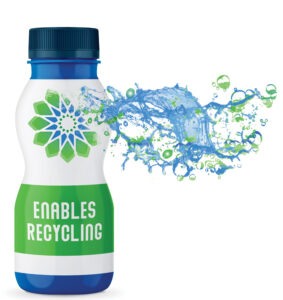But it’s not just about pushing the boundaries of visual excellence; sustainability is at the heart of these technological strides. The industry is seeing a significant shift towards bio-based and recycle-ready inks, a response to the growing demand for environmentally friendly printing solutions.
Renee Schouten, vice president of marketing at INX International Ink Co., highlights INX’s innovation in this area: ‘Our INXHRC natural-based inks are a breakthrough, replacing petrochemical ingredients with clean, renewable ones without compromising on performance. These inks are designed to meet the rigorous demands of modern printing processes while significantly reducing their environmental impact. This shift not only helps printers align with global sustainability goals but also offers a compelling value proposition for brands eager to showcase their green credentials.’
One of the most exciting advancements comes in the form of INX Genesis washable inks, which have the potential to revolutionise recycling processes for plastic films. Traditional inks have long been a stumbling block in the recycling of printed plastics, often contaminating the recycling stream and limiting the usability of recycled materials. ‘With Genesis inks, we’re able to produce high-quality recyclable materials,’ she explains. The unique formulation allows the ink to be easily removed during recycling, minimising contamination and enabling the production of new, clear bottles from recycled plastic. This innovation not only supports a circular economy but also addresses the critical issue of plastic pollution in our oceans.
Advances in drying and curing technologies have also played a crucial role in enhancing the efficiency and sustainability of the print process.
The advent of LED UV curing, for instance, has transformed the way inks bond to substrates. ‘The INXCure line, which cures with minimal energy, is a prime example of how we’re cutting down on power consumption and improving the lifespan of printing equipment,’ remarks Renee. Unlike traditional UV curing, which generates significant heat and odours, LED UV curing is a cleaner, more energy-efficient process that aligns with the industry’s shift towards greener operations.

In addition to these groundbreaking inks, specialised coatings are making their mark in the packaging sector. Functional coatings like INX Ecostage GBX are designed to protect products from environmental factors while enhancing the recyclability of packaging. ‘These coatings are truly transformative,’ she asserts. ‘By enabling mono-material packaging, they simplify the recycling process and reduce the reliance on multi-layer films, which are notoriously difficult to recycle. This not only extends the shelf life of products but also contributes to the reduction of food waste –another significant benefit in the fight against climate change.’
The print industry’s future is not just about what’s new – it’s about what’s next. As Renee puts it: ‘We’re constantly pushing the envelope to deliver inks and coatings that not only perform better but also support a more sustainable world.’ With each new development, INX and other industry leaders are proving that innovation in ink technology is about more than just making things look good; it’s about making them last, making them sustainable and ultimately, making a difference.
Ed’s note: INX products are proudly represented in Southern Africa by Constantia Printing Inks. Contact Ross for more information: rhtaggart@mweb.co.za.









